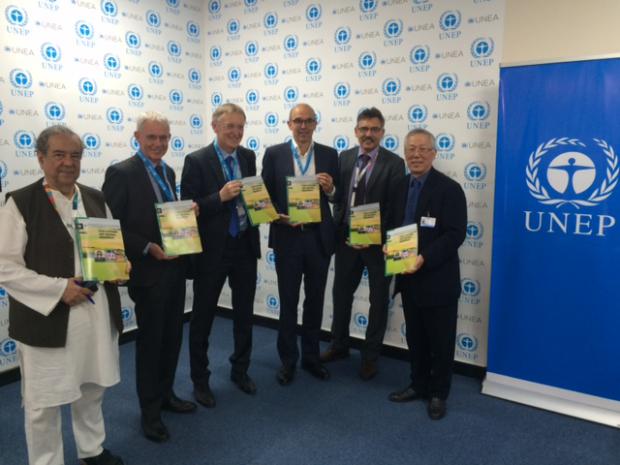Top 12 Ways World Can End Hunger, Stem Environmental Damage from Food Systems
Discussion details

Latest IRP report lists 12 ways to use natural resources more efficiently, improve human health and reduce the environmental damage caused by food systems
Nairobi, 25 May 2016 – A major overhaul of the global food system is urgently needed if the world is to combat hunger, use natural resources more efficiently and stem environmental damage, the International Resource Panel (IRP) says.
In its latest report, the IRP – a consortium of 34 internationally renowned scientists, over 30 national governments and other groups hosted by the United Nations Environment Programme (UNEP) – calls for a switch to a “resource-smart” food system that changes the way food is grown, harvested, processed, traded, transported, stored, sold and consumed.
Current food systems, which the IRP says are “inefficient” and “unsustainable”, are responsible for 60 per cent of global terrestrial biodiversity loss and about 24 per cent of global greenhouse gas emissions. They are also responsible for the overfishing of 29 per cent of commercial fish populations and the overexploitation of 20 per cent of the world’s aquifers.
Although food production has increased across the world, more than 800 million people remain hungry, more than two billion suffer from micronutrient deficiencies – mainly vitamin A, iodine, iron and zinc – and more than two billion people are overweight or obese, the report notes. Compounding the problem, pressure on natural resources is expected to rise as populations grow and demand for food increases.
To combat these problems, the IRP says a “resource-smart” food system should be adopted, a system that adheres to three principles: low environmental impacts, the sustainable use of renewable resources and the efficient use of all resources.
Compounding current problems, rising wealth in developing countries will lead people to adopt diets that are richer in resource-intensive products – meat, fish, fruits, vegetables and highly processed foods – at a time when climate change will make producing food increasingly difficult.
As per-capita income rises, people’s diets change from one that is largely rich in carbohydrates to a diet richer in calories, sugars, and lipids, with more livestock-based products. In combination with an increasingly sedentary lifestyle, this has led to a sharp increase in obesity, the report states.
It blames the high consumption of animal-based products and highly processed foods for triggering “disproportionate environmental costs” while undermining public health due to obesity related disease.
A combination of the various options listed in the IRP report, at different points of intervention and by diverse actors throughout the system, could lead to resource efficiency gains of up to 30 per cent for certain resources and impacts.
The full report van be downloaded here.
Infographics: http://bit.ly/1WT5f4i
About the IRP
The International Resource Panel assesses the latest scientific, technical and socio-economic findings on global resource use to provide science-based advice for policy-makers, industry and the global community on ways to improve global and local resource management. The Panel works to steer the world away from overconsumption, waste and ecological harm to a more prosperous and sustainable future.
http://www.unep.org/resourcepanel/
About UNEA
The United Nations Environment Assembly (UNEA) is the world’s most powerful decision-making body on the environment, responsible for tackling some of the most critical issues of our time. The assembly holds the power to dramatically change the fate of the planet and improve the lives of everyone, impacting everything from health to national security, from the plastic in our oceans to the trafficking of wildlife. Thanks to UNEA, the environment is now considered one of the world’s most pressing concerns alongside other major global issues such as peace, security, finance and health.
This year, hundreds of key decision makers, businesses and representatives of intergovernmental organizations and civil society will in May gather at UNEA-2, taking place at the United Nations Environment Programme headquarters in Nairobi, for one of the first major meetings since the adoption of the 2030 Agenda for Sustainable Development and the Paris Climate Agreement. The resolutions passed at UNEA-2 will set the stage for early action on implementation of the 2030 Agenda, and drive the world towards a better future, more-just future. UNEA-2 is also inclusive, with myunea.org allowing citizens to feed their concerns into the meeting and take personal ownership of the collective challenges we face. http://web.unep.org/unea
Log in with your EU Login account to post or comment on the platform.